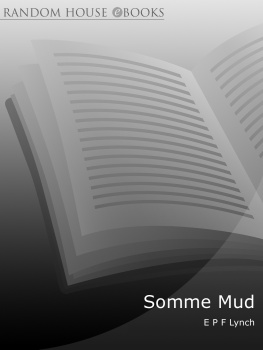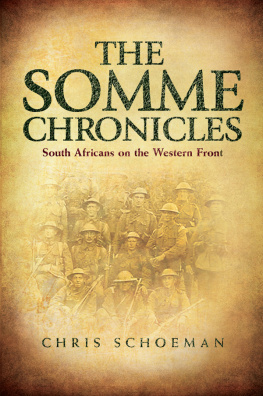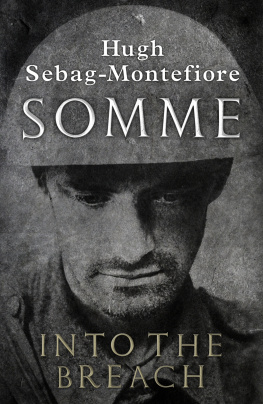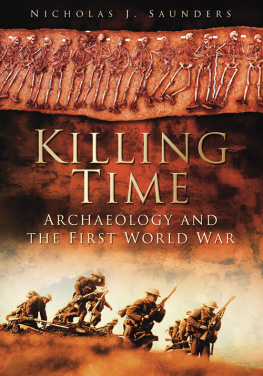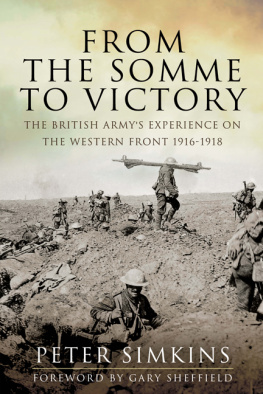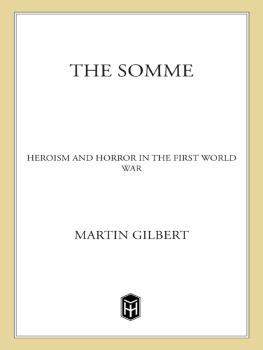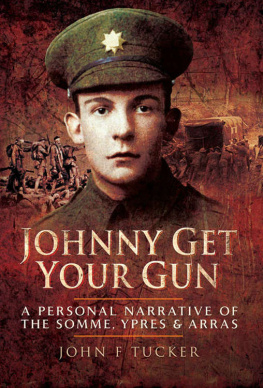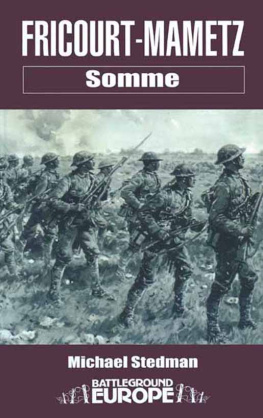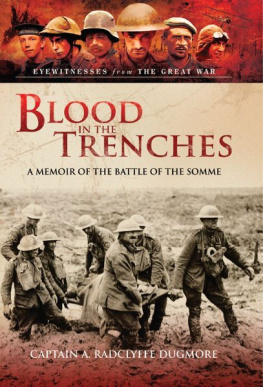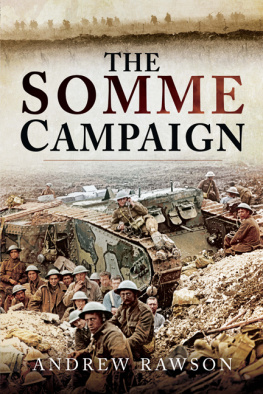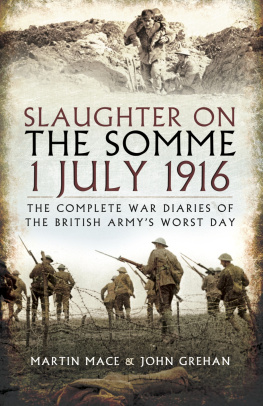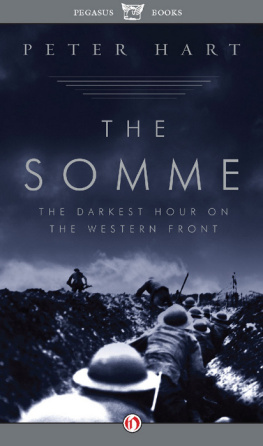E.P.F. Lynch - Somme Mud
Here you can read online E.P.F. Lynch - Somme Mud full text of the book (entire story) in english for free. Download pdf and epub, get meaning, cover and reviews about this ebook. year: 2008, publisher: Doubleday UK, genre: Home and family. Description of the work, (preface) as well as reviews are available. Best literature library LitArk.com created for fans of good reading and offers a wide selection of genres:
Romance novel
Science fiction
Adventure
Detective
Science
History
Home and family
Prose
Art
Politics
Computer
Non-fiction
Religion
Business
Children
Humor
Choose a favorite category and find really read worthwhile books. Enjoy immersion in the world of imagination, feel the emotions of the characters or learn something new for yourself, make an fascinating discovery.
- Book:Somme Mud
- Author:
- Publisher:Doubleday UK
- Genre:
- Year:2008
- Rating:3 / 5
- Favourites:Add to favourites
- Your mark:
- 60
- 1
- 2
- 3
- 4
- 5
Somme Mud: summary, description and annotation
We offer to read an annotation, description, summary or preface (depends on what the author of the book "Somme Mud" wrote himself). If you haven't found the necessary information about the book — write in the comments, we will try to find it.
Somme Mud — read online for free the complete book (whole text) full work
Below is the text of the book, divided by pages. System saving the place of the last page read, allows you to conveniently read the book "Somme Mud" online for free, without having to search again every time where you left off. Put a bookmark, and you can go to the page where you finished reading at any time.
Font size:
Interval:
Bookmark:
About the Book
We live in a world of Somme mud. We sleep in it, work in it, fight in it, wade in it and many of us die in it
Private Edward Lynch enlisted in the army aged just eighteen. As his ship set sail for France, the band played and the crowd proudly waved off their young men. Men who had no real notion of the reality of the trenches of the Somme; of the pale-faced, traumatised soldiers they would encounter there; of the mud and blood and the innumerable contradictions of war.
Upon his return from France in 1919, Private Lynch wrote about his experiences in twenty school exercise books, perhaps in the hope of coming to terms with all that he had witnessed there. Now published here for the first time, his story vividly captures the horror and magnitude of the war on the Western Front as experienced by the ordinary infantryman.
Told with dignity, candour and surprising wit, Somme Mud is a testament to the power of the human spirit for out of the mud that threatened to suck out a mans very soul rose this remarkable true story of humanity and friendship.
CONTENTS

This narrative is dedicated to the sons of the diggers of the First A.I.F. in the hope that they will strive to recapture and perpetuate the digger spirit of the older A.I.F.
FOREWORD
Professor Bill Gammage
I state something that, after forty-five years of learning about the men of the First AIF, I never expected to say: this book compares with All Quiet on the Western Front in what it says, and how it says it. Both are front-line memoirs of men steadily becoming more professional and more disillusioned under the slaughter and stalemate of the Great War. Both are magnificently written. They use the present tense, and in moments of high drama they use short sentences and small words to make the action fast and close. They use detail brilliantly sharp, vivid, not overloaded, just enough to let readers see the scene, sense being there, feel anxious about what will happen. Somme Mud puts you in the trenches, enduring the mud and the cold, smelling the stink of whale oil, following the dogfight overhead, suffering deaths randomness. You watch Snow snipe a German half a mile away, then the next day risk his life to save another German and be reprimanded for it. You are brought close up into that wars world, wondering how such men could ever be civilians again, if they got the chance.
There are differences between the books. Remarque wrote a memoir and a literary work. He chooses when his story begins and he has his narrator die on that quiet day in October 1918. This book is a memoir built on a wartime diary and a unit history the sense of a personal journey never leaves it. It begins as 12th Brigade reinforcements leave Sydney. It ends with the survivors home and facing the post-war world a rare glimpse, for few narratives do that, published or unpublished, and none do it so well. I wanted the author to go on, but I also pay tribute to how far he has gone, pushing himself to bring such terrible memories to such stark and detailed reality. Scars must have opened, nightmares must have stalked, but he has left a mighty tribute to his mates, an epic of his generation, and a great gift to his country. I wish I had met him.
PREFACE
Will Davies
What you are about to read is a narrative written by a young Australian soldier, Private Edward Lynch, during the First World War. Like all Australian soldiers at that time, Private Lynch was a volunteer. Like many, he was only eighteen years old when he set sail for France a mere youth. He was part of a draft of reinforcements that departed Australia on 22 August 1916 on board the ship Wiltshire.
In France, the Australian Imperial Force at the time was engaged at Pozires and in taking the Windmill and Mouquet Farm in what was to become the most bloody and costly fighting of the war. In just eight weeks there were 23,000 Australian casualties, but this would not have been known to Lynch and his mates as they steamed westward. Nor would they have known that when winter set in in late November 1916, the war would become one of survival against the elements rather than simply the Germans.
Lynch was repatriated in mid-1919 and wrote about his experiences in pencil in twenty exercise books in 1921, probably in the hope of exorcising the horrors he had witnessed. He claimed that the main character was a friend of his, but it is generally believed that Nulla was in fact based on himself and that Lynch may have used the device in order to try to distance himself from the story.
In the early 1930s, Lynch typed up the book with the aim of having it published and earning some much-needed money . By then Australia was in the midst of a Depression and Lynch had a young family to support. But the scars and pain of the Great War were too new and too deep for the public to want to be reminded of it, and so, with the exception of some excerpts that were published in the RSL magazine Reveille, the manuscript remained with the family, a hidden and untold story.
I became involved by chance in 2002 when I was loaned the typed manuscript a great heavy tome 9 centimetres thick by my friend and colleague Mike Lynch, the authors grandson. Mike knew of my interest in the period and of my work on a battlefield guide for the Department of Veterans Affairs in 1998 to commemorate the battle of Hamel, and asked if I would be interested in reading his grandfathers work.
As a friend I was happy to oblige, and to be honest I was intrigued. After reading just one chapter I was captivated, not only by the story and its honesty, but by the detail, and the depiction of an ordinary young Australian in extraordinary circumstances. It soon became clear that this manuscript was an important historical record; it was, in a sense, a literary time capsule.
With the familys permission I set about editing it, mindful of keeping the integrity of the story intact. While this is an abridged version, the turn of phrase, the language and, in todays terms, some very politically incorrect words and racial descriptions, are unaltered. These remain as a record of the attitude and language of the period.
Somme Mud has been for me a labour of love and I feel privileged and honoured to have been able to help it see the light of day.

Overview of the Western Front

Overview of the main battlefields of France in Somme Mud

Overview of the main battlefields of Belgium in Somme Mud
ONE
Good-bye, Sydney Town, Good-bye
HIGH IN THE clear morning air rings the lilt of our marching songs as we step out, many of us with our feet just on the first rung of the ladder of manhood.
Through flag-bedecked streets we go ever onward. The windows and roofs of shops are gay with bright flags and pretty, laughing girls. The crowds line the footpaths happy in the bon camaraderie of their farewell to us. Here and there are silent women in black, mute testimony to what has befallen others who have marched before. We swing cheerfully on.
A woman breaks from the crowded footpath and arm in arm with her soldier husband marches on with us. She has taken barely a dozen steps when high, clear and laughingly comes another song.
Font size:
Interval:
Bookmark:
Similar books «Somme Mud»
Look at similar books to Somme Mud. We have selected literature similar in name and meaning in the hope of providing readers with more options to find new, interesting, not yet read works.
Discussion, reviews of the book Somme Mud and just readers' own opinions. Leave your comments, write what you think about the work, its meaning or the main characters. Specify what exactly you liked and what you didn't like, and why you think so.

